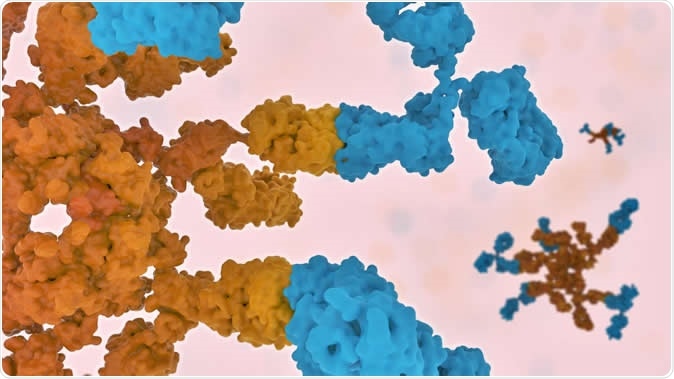Researchers have homed in on the cells that cause an autoimmune disease to arise in the body. The study, published in the journal Cell in February 2020, as part of the Hope Research project, reports on the discovery.
Autoimmune diseases occur when cells from an individual's own body that are designed to maim and kill foreign cells, such as bacteria and viruses, turn on the body's tissues instead and destroy them. There are over 100 autoimmune diseases known today. About 1 in 8 people suffer from such conditions.
The lack of understanding of the root cause of autoimmune disease means that treatment for autoimmune conditions is mostly symptomatic. Most clinicians aim at reducing the level of immune cell activation and controlling inflammation in other organs such as the joints, kidneys, and skin. None of the current treatments addresses the course of the disease directly.
The problem was with the extreme rarity of the rogue cells in a blood sample. Often, they make up less than 0.25 percent or 1 in 400. The most sophisticated analyses of these cells to date have yielded only an estimated average of the enormous variety of different immune cells in the sample. The current study thus switched to sequencing the genome of each cell in the sample.
The study
The researchers at the Garvan Institute of Medical Research have taken a big step towards this goal. For the first time, they found the exact cells that cause autoimmune disease, from actual blood samples taken from patients with these conditions. By examining their working, they also found out how these cells turn 'rogue,' developing their techniques of slipping through the safety net – called immune checkpoints – that are in place to prevent immune cells from turning on the host tissues themselves.
The researchers studied samples from four patients with an autoimmune disease called cryoglobulinemic vasculitis (CV), which causes intense and chronic inflammation of the blood vessels. CV is a severe and crippling condition that develops in other autoimmune diseases like Sjogren's syndrome, SLE, rheumatoid arthritis, and hepatitis C.
They used cellular genomics, which involves first extracting the different types of cells separately, picking out individual cells, and then taking out the DNA for analysis.
In this painstaking manner, they were able to separate the immune cells that secrete the antibodies called rheumatoid factors (RF). This protein latches on to healthy tissues to trigger immune activation against them, resulting in damage. One classic example is rheumatoid arthritis.
The DNA and RNA of each of these cells were examined at more than a million loci. The aim was to find and list the DNA variants that could be triggering the autoimmune process.

Researchers discovered that in patients with cryoglobulinemic vasculitis, antibodies in the blood aggregate at colder temperatures closer to the skin and also in the kidneys, nerves, and other organs, damaging blood vessels. Image Credit: Dr Ofir Shein-Lumbroso
The findings
The researchers found that each of these immune cells that were producing immune factors directed against the body had built up a number of mutations in the past. This step-by-step alteration in genetic function caused them to slowly transform into rogue cells, which finally secrete RF.
Some of these mutations were common to the driver mutations found in lymphomas as well. This explains why they could successfully escape immune surveillance and proliferate in an uncontrolled manner.
Goodnow exults, "We have developed a technique that allows us to look directly at the cells that cause autoimmune disease - it's as though we're looking through a new microscope lens for the first time, learning more about the autoimmune disease than was ever possible before."
Goodnow put forth his theory that autoimmune cells were using this strategy, observed in cancer cells, back in 2007. Explaining the current finding, he says, "We uncovered 'lymphoma driver mutations', including a variant of the CARD11 gene, which allowed the rogue immune cells to evade immune tolerance checkpoints and multiply unchecked."
Another striking feature was that these cells that carried the lymphoma driver mutations went on to acquire more and more variant genes. Finally, these altered genes caused the clumping or aggregation of the RF they secreted under cold conditions.
Explaining what happens in CV, Joanne Reed says, "In these individuals, rheumatoid factors in the blood aggregate at colder temperatures closer to the skin and also in the kidneys, nerves, and other organs, which damages blood vessels and often proves very difficult to treat."
The implications
The new study could be invaluable in helping to diagnose and treat autoimmune disease in the early stages. If the individual cells responsible for an autoimmune disease can be isolated, it indicates the potential for highly targeted diagnostic tests and personalized treatments to hit each of these conditions at the root.
Reed points out, "If we can diagnose a patient at these stages, it may be possible to combine our knowledge of these mutations with new targeted treatments for lymphoma to intervene in disease progression or to track how well a patient is responding to treatments."
The next step for these researchers is to find more mutations found in other autoimmune diseases like celiac disease, lupus, and type 1 diabetes mellitus. Finding the rogue cells is a huge advance towards understanding how autoimmune diseases set in, and as Goodnow says, "crucially the first step to finding ways to eliminate them from the body entirely."
Journal reference:
Lymphoma Driver Mutations in the Pathogenic Evolution of an Iconic Human Autoantibody Singh, Mandeep et al. Cell, https://www.cell.com/cell/fulltext/S0092-8674(20)30110-0